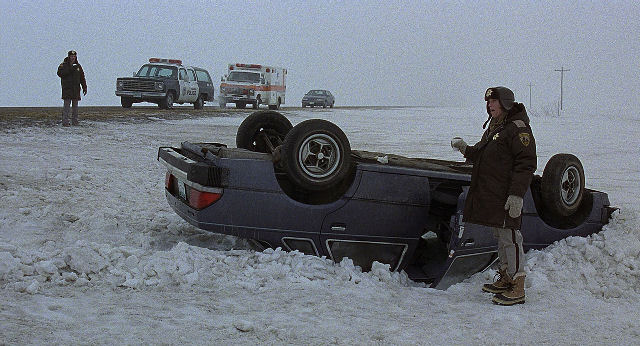Fargo
Directed by Joel Coen
Written by Joel and Ethan Coen
1996, USA
The Coen brothers are a breed of their own, seamlessly melding quiet, unrelenting humor with often brutal violence. Their films present wild irony, eccentricity, and post-modern takes on classic genre films. I have always been a huge fan, from Raising Arizona to No Country for Old Men. For years, nearly the only Coen bros. film I had not seen was Fargo, which is a pity because Fargo brought them their first awards for writing and directing. Ahead of their Cannes debut of Inside Llewyn Davis, I finally sat down to witness the dry wit saturating the story of police chief Marge Gunderson.
Minnesota in winter. Jerry Lundegaard (William H. Macy) has financial troubles and makes the completely logical decision to have his wife kidnapped and ransomed for her father’s money. The hired men are the “funny looking” one (Steve Buscemi) and the silent one (Peter Stormare). Unfortunately, the kidnapping goes awry, and they are forced to resort to extreme violence. Three times. On the case is Marge Gunderson (Frances McDormand), a very pregnant investigator trying to connect these three homicides.
Fargo opens with an intertitle reading:
THIS IS A TRUE STORY. The events depicted in this film took place in Minnesota in 1987. At the request of the survivors, the names have been changed. Out of respect for the dead, the rest has been told exactly as it occurred.
The film is entirely fictional. What the Coen brothers accomplish with this claim to authenticity is to gain the trust of the audience. If the audience believes that the film is based on true events, the brothers can write characters and events that otherwise would be unbelievable. For instance, the criminals in Fargo are ridiculously inept, bordering on the incompetence of the bungling hit man in David Lynch’s Mulholland Dr. The characters of Carl Showalter and Gaear Grimsrud (Buscemi and Stormare), mismatched accomplices in crime, provide comedic relief in this black comedy of criminal error. They are, in effect, undone by their own futile plans.
Helming the investigation into their bungled homicides is Marge Gunderson. Marge counters the darker elements of Fargo with her symbolism of extreme maternal goodness. Her first introduction on screen shows her seven months pregnant and comfortable in her traditional home life. She and her family represent the exact opposite of the mistrust pervading Jerry Lundegaard’s family relations and domestic life. Lundegaard’s father-in-law, Wade Gustafson, clearly cares nothing for him, yet assures that “Jean and Scotty will always be taken care of.” His resulting response is therefore a calculating deceit involving lying to his wife and son. In contrast, Marge has a traditional, even wholesome, family. Quite literally, violence and death follow Lundegaard and his actions, yet Marge is a vessel for life and a perfect symbol for justice in this case.
The story of Fargo is rather dark and thoroughly violent, but the Coen brothers once again create a film about violent events that plays as a laughable comedy. So, in their practiced hands, Jean Lundegaard’s botched kidnapping becomes a darkly comic tale brimming with quintessentially Coen black humor.
– Katherine Springer




